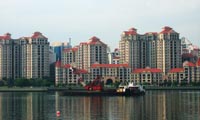Singapore is now the world’s most expensive city, according to the new rankings of the Economic Intelligence Unit (EIU). Singapore which ranked sixth in the same survey last year has now overtaken Tokyo (which topped the list last year), Osaka, Sydney and Melbourne, which all occupied top positions that year.
The EIU surveyed 140 cities across the world, with New York City as a base, and compared the costs of 160 products and services like food, household supplies, transport, domestic help, utility bills, clothing, home rent, private schools and recreation.The authors of the report observe that in the case of Singapore, the rise in price prominence has been ‘steady rather than spectacular’ in the recent years. In the last year, the cost of living in Singapore has declined as compared with New York City. But through the last ten years, Singapore has also witnessed a 40 percent appreciation of its currency along with price inflation, thereby accounting for its highest ranking this year. Other factors that may have contributed to this situation include the high car ownership taxes and certificate of entitlement fees, which are necessary for buying any vehicle in the city. This has resulted in a car costs that are almost thrice as high as that in New York. With regard to utility costs, Singapore ranks as the third most expensive city, owing to its reliance on other nations for energy and water to compensate for its scarcity of resources. Further, the report states that Singapore is the most expensive destination for buying clothes, which the EIU attributes to the proliferation of expensive malls and boutiques catering to ‘a wealthy and fashion conscious consumer base’.
In response to the survey, the Singapore government stated that the overall picture is not exactly what the survey makes it out to be. For instance, the high transport costs were attributed to the high certificate of entitlement fees, but Singapore does also have modes of public transport such as taxis, which are quite plentiful and inexpensive, and the MRT underground, which is also cheap, efficient and will have expanded its coverage over the next few years. Expats who need to move around the city a lot can request for a travel allowance from their employer. It may also be convenient to rent or lease a car, especially in the case of families with children where public transport may become cumbersome.
In the case of food, the survey stated that some products such as bread and wine are extremely costly as they are usually imported. But it’s also true that shopping for regular food items or eating out at the average Singapore restaurant is not very expensive. In fact, there are many handy food courts located just outside offices to cater to the working population.
Expats also need to bear the high costs of childcare and schooling in Singapore. International schools are considerably more expensive than public schools, since English is the teaching language and the education system is known to be more efficient.
Many expats, who have been living in Singapore for a while, feel that the biggest strain on their budget comes from the costs of housing, which no doubt have stabilized due to government measures, but are yet to reduce. Singapore has the third highest population density globally, making real estate a restricted and expensive affair. Expat benefits packages are hugely beneficial here, if there is certainty that the employer will cover at least a portion of the accommodation price. For those that don’t have this option, there are some ways to save on costs, such as sharing a flat (in case of single expats) or living in government-subsidized housing (these are modern and located in good areas, but may have a long waiting list with locals getting preference). With a higher budget, one can also rent a private flat or a condominium, which vary considerably in price depending on the area and facilities on offer.
Despite the EIU report, some expats are still optimistic and hold the view that a strong currency in Singapore is actually a benefit to the people working there, and that the low tax environment and high-quality commercial and industrial infrastructure makes Singapore a lucrative destination to live in.

